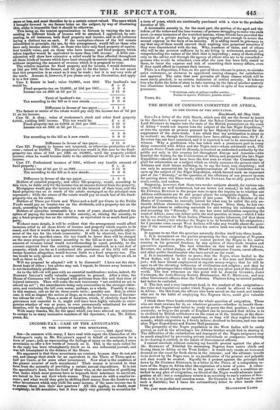1NCOME-TAX : CASE OF THE ANNUITANTS.
TO THE EDITOR OF THE SPECTATOR.
—, 30th April 1842. Sin—In common with many, I have read with regret the Chancellor of the Exchequer's reply to Mr. RICARDO'S appeal in behalf of annuitants for a term of years ; and, as representing the feelings of many on the subject, I crave permission to offer a few words of remark on it. This is the more called for as the reply has been triumphantly dwelt on in one influential journal, and was left triumphant in the debates of the House. His argument is that these annuitants are content, because they do not sell out, and change their stock for an equivalent in the Three or Three-a.nd-a- half per Cents, or for some other investment. Now what is the condition of the greater number of such annuitants? Their money is invested in that form from the necessity of providing a certain annual expenditure. It is not the speculator's fund, but the fund of those who, at the sacrifice of gratifying that desire which most persons have to bequeath their substance to survivors, are forced to live out their whole means. They cannot do with a smaller in- come; and what would they gain by shifting their money from the funds to any other investment which may yield the same income, if the same income-tax is to pursue them into their new quarters ? All this applies, no doubt, most Completely, to life annuities ; but it does apply very generally to annuities for
a term of years, which are continually purchased with a view to the probalbe duration of life.
A terminable annuity is, for the most part, the portion of the aged and the infirm ; of the widowand the lone woman; of persons struggling to make two ends meet ; in some instances of the wretched maniac, whose friends have provided the decencies of a private asylum, by getting together just enough to secure the annual expense in the form of an annuity. It is adding insult to grievance to say that any of these would convert their expiring into perpetual annuities if they were discontented with the tax. Why, numbers of those, and of others who will be the severest sufferers by it, are living in retirement, scarcely yet comprehending the nature of the blow that is impending ; many of them acting only on the advice and through the agency of others who are to be consulted— persons who would be reluctant, even after the case has been fully stated to them, to incur the expense and risk of unsettling their money-affairs, even if they could afford to contract their income.
There is a disposition, I fear, on the part of those who are in power, to mistake quiet endurance, or slowness to apprehend coming changes, for satisfaction and approval. The calm that now pervades all those classes which will be most sorely pinched, is no certain indication of settled serenity. It behoves him who holds the helm of state to take warning by the fate of another scarcely less illustrious helmsman, and to be wide awake in spite of fine weather ap- pearances.
0 niminm ecelo et pelago conese sereno. Nudes in ignota, Patient°, jacebis arena!"


























 Previous page
Previous page